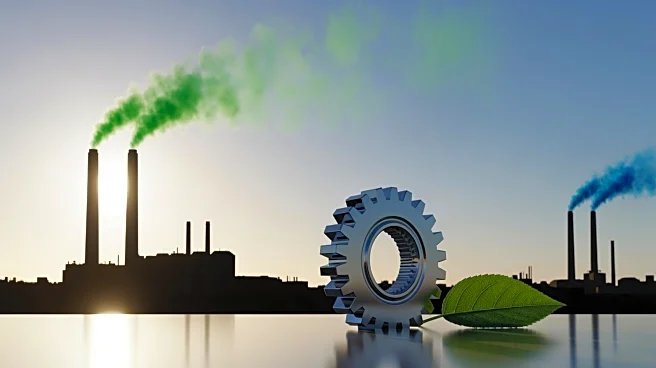What's Happening?
PepsiCo, Nike, and Heineken are taking significant steps to reduce industrial emissions through innovative technologies and partnerships. PepsiCo is utilizing biomethane sourced from organic waste at its food processing facilities, notably at its Manisa,
Turkey facility, which converts waste into biogas to meet 35% of its electricity needs. Nike is transitioning away from coal-fired boilers by adopting biomass as an interim solution, while also exploring steam heat pumps used in other industries for fabric dyeing processes. Heineken is installing a 100-megawatt heat battery at a Portuguese brewery, which will reduce reliance on fossil fuels. These initiatives are part of broader efforts to address industrial emissions, which account for a significant portion of U.S. greenhouse gas emissions.
Why It's Important?
The efforts by PepsiCo, Nike, and Heineken to reduce industrial emissions are crucial in the fight against climate change. Industrial emissions contribute significantly to global greenhouse gas levels, and innovative solutions like biomethane, biomass, and thermal batteries can help mitigate this impact. These companies are setting examples for others in their respective industries, demonstrating that sustainable practices can be integrated into existing operations. The adoption of these technologies not only reduces emissions but also promotes energy efficiency and sustainability, potentially influencing public policy and encouraging other businesses to follow suit.
What's Next?
As these companies continue to implement and refine their strategies, they may face challenges such as ensuring the sustainability of biomass sources and managing the high upfront costs of new technologies. Collaboration with industry partners and feasibility studies, particularly in regions with renewable electricity availability, will be crucial for scaling these solutions. Heineken's heat battery project, set to begin operation in April 2027, will serve as a test case for the effectiveness of service agreements in financing sustainable technology adoption. The success of these initiatives could lead to broader adoption across industries, further reducing industrial emissions.
Beyond the Headlines
The shift towards sustainable industrial practices by major companies like PepsiCo, Nike, and Heineken highlights the growing importance of corporate responsibility in addressing environmental issues. These efforts may lead to long-term shifts in industry standards, encouraging more companies to invest in sustainable technologies. Additionally, the focus on reducing emissions aligns with global climate goals and could influence regulatory frameworks, pushing for stricter emissions standards and incentivizing green innovations.














